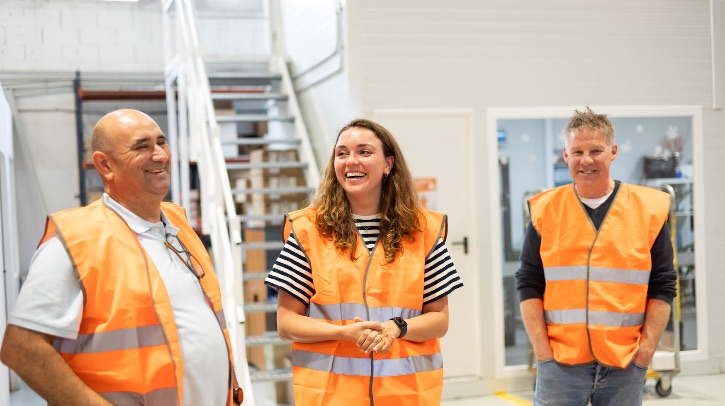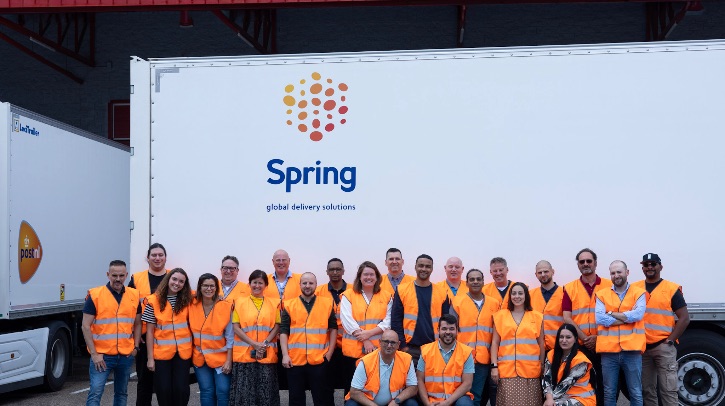Kelly van der Weg, managing director of Spring Global Delivery Solutions UK, explains how the company helps retailers overcome complex cross-border e-commerce challenges
Tell us about Spring GDS and how it has developed.
Spring GDS was established around 25 years ago, and we have evolved throughout the years. The most recent impactful change happened around six years ago when PostNL and Spring GDS decided to separate the business with a clear focus on e-commerce in global regions. PostNL became focused on imports and exports in the Benelux market, and Spring GDS created an Asia-America model and a European model. These models are governed separately and have different business focuses – different types of customers, different service levels, etc – but our logistics are connected as we are all one company.
Spring UK is part of Spring Europe. It is an anomaly within that structure as it is one of the two non-EU countries next to Switzerland, but it drives quite a big part of the total value of Spring Europe. We have a total of 15 countries and Spring UK is one of the largest.
We are strong because we use each other’s networks. So we have hubs in each individual country and we connect them with trucks. We have brokered solutions where Spring GDS mixes postal solutions with commercial solutions, which makes us able to offer our customers a fluid solutions set.

Where are you seeing the most growth regionally?
Import toward the UK remains complex but it is one of our best-selling solutions, so we support our customers with customs clearance and connecting to the network on mainland UK. We are also very good overseas and across borders toward the USA. Per origin, we focus on the neighboring countries, so the UK is very good toward the Netherlands, Belgium, France, Ireland and Scotland. Globally we have about 40 partners with 190 postal solutions, and that optimal blend really means we can reach all kinds of customers and retailers.
How do you help SMEs and enterprise businesses achieve e-commerce success?
We support the full scope of business sizes, and we want to be as close as possible to the decision-makers, which means working closely with retailers. But that isn’t the nature of B2C commerce – there are many players – so we have a lot of cooperations with 3PLs and consolidators, but also with our competitors in the UK. We use each other’s solutions, and this means we can act for all business sizes.
What challenges are you finding in the cross-border e-commerce market?
First of all, if I look inward at the challenges around finding talent, we are focused on consultative selling rather than going out to market with rate cards. We want to deep dive into the supply chains of our customers, which is a broad spectrum, so finding the right people who can do that type of consultative selling is quite hard for us, but we are succeeding well.
In the outside world, the industry is a commoditized world, so you need to find your niche solutions and we do that by being bespoke. Many of our solutions are tailored to the specific needs of each customer – we take away the hassle, we take away the complexity of tax returns, VAT visibility, how to do customs clearance, etc. We are now moving into helping with the complexities around fulfillment, because if you’re a growing party and you want to go out and raise your website, do your marketing, do your distribution and set up all your operations, there comes a point when you need to focus. We want to help our customers one step earlier in the value chain by supplying value-added services such as fulfillment in addition to distribution.
How do you support sustainable operations?
A year ago, we took a bold step by betting on HVO100 – a highly promising alternative capable of significantly reducing CO₂, NOx and particulate emissions. Today, we can confidently say that the potential was real: we saved 1,034,861kg of CO₂ emissions in the UK, helping reduce road transport emissions without waiting for the rollout of electric truck infrastructure. These savings are meaningful and demonstrate that viable alternatives to traditional diesel do exist, even for road transport.
What projects have you worked on recently?
We have recently started working with JD Sports, which is tremendous news. We’re collaborating more with high-end and iconic brands in the UK. One of our biggest customers is The Hut Group – well known for its 20 brands in the UK – and we carry most of their volume. We are a strategic partner for them and we’ve both learned a lot from each other.
We’re also expanding our scope. We originally focused on England and had some customers in Wales and Northern Ireland, but a few months ago we decided to move into the Scottish market, which has its complexities but there is really a need for parties like us, so we are gaining traction and bringing in our first customers in that market.

What are your plans for service expansion?
We are going global so we have Spring GDS expansion in the Asian market – we’re looking to move into the south Asian region – that will help establish our network even further. We’re also continuously developing lanes in South America, Canada and the USA. Also in the Middle East, which, although sensitive, is a market with rising demand for European goods.
We also want to firm up our networks, so we have a dual vendor approach in the main markets but also in Tier 2 countries – we want to offer flavors and choice so we’re adding a lot to that area. Out-of-home solutions like PUDO and locker have a positive sustainability impact as well as a financial benefit for sellers. As Spring GDS, we have one of the largest ‘collect’ networks in Europe.
At Spring UK, we are diversifying by means of fulfillment, which gives us more balance, and we can only do that by investing in technology and in our people. As we speak, we have hired eight people this year and we continue to seek that high-end talent, as well as invest in the latest technologies for our internal transformation.
What makes Spring GDS stand out from your competitors?
I think it is our personality and the way we interact with our customers – we are personal, direct and always available. That is worth nothing if you’re not actively working with the customer, so we are also creative, responsive and solution driven. We almost never say no – sometimes we probably should, with hindsight – but we always try to help our retailers grow so we’re always open to ideas. Our customers tell us that we truly listen, that we are creative, solutions focused and results driven. That shows in our very high European NPS score of 42. And finally, our organization is agile and fit to adapt to the continuous demands of the market.
This article was originally published in the September 2025 issue of Parcel and Postal Technology International – free to read here.


